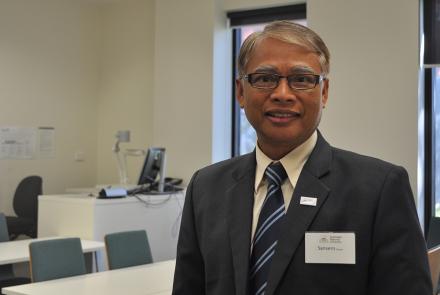
NACC Secretary-General Sansern Poljieak at Crawford School
Thailand's fight against corruption
In July this year Thailand enacted a new anti-corruption law that extends a maximum penalty of capital punishment to foreigners.
Cracking down on corruption in Thailand is no joke and the country’s National Anti-Corruption Commission (NACC) is determined to unite the Thai community and tackle the problem.
The Secretary-General and Deputy Secretary-General of the NACC of Thailand recently observed a short course on Anti-Corruption, Accountability and Good Governance at Crawford School of Public Policy.
Secretary-General Sansern Poljieak and Deputy Secretary-General Prayat Puangjumpa were joined by the heads of around 20 of NACC’s Provincial offices as well as other NACC Directors.
The NACC is the organisation responsible for the ethical conduct of elected politicians and civil servants. The commission have both powers of investigation and prosecution.
In a recent interview at Crawford School Mr Poljieak explained some of the key challenges facing the commission.
“There is currently a lack of support in Thailand coming from the public sector, that includes the budget, constraints on personnel and equipment as well as other tools necessary to conduct investigations,” he said.
“To enable us to succeed in tackling corruption we need the political will and the political support.”
But, despite the ongoing challenges Mr Poljieak said it was important for the NACC to continue to progress its strategic agenda.
“In the short term we will be trying to get support from the government, particularly in terms of personnel training to increase the professionalism of staff,” he said.
“In the medium term we would like to be able to attract more cooperation from all areas of society – public sector, private sector, the media and the public at large as well as the legal reforms necessary to be in compliance with international obligations Thailand is a party too.
“Lastly, we would like to see more transparency in the operation of all government departments and ministries and also attempt to increase the corruption index rating of our country according to our national strategy.”
Bribery and conflict of interests still occur in Thailand’s private and public sectors so the NACC campaigns to change and improve the attitudes and values of politicians and Thai public servants.
“We need to ensure that they [politicians and Thai public servants] are not trying to get into office for personal gain,” said Mr Poljieak.
The public are important in helping to tackle corruption, he added, but first they must have confidence in the system.
“Once the public has confidence in us they will be more willing to lodge a complaint and use our services to help tackle corruption.
“The key to success in tacking anti-corruption is support and cooperation from other relevant bodies in society – everyone should help.”
With an aim to improve Thailand’s corruption perception index rating to 50th place by 2017 (from 85th in December 2014) the NACC has a lot of work to do.
Part of the organisation’s approach is to engage with other countries to broaden their perspective through knowledge and learning – an approach which brought key officials to Crawford School last month.
The Anti-Corruption, Accountability and Good Governance course provided attendees with real case studies and opportunities to draw on the personal experiences of the speakers.
The course focused on facilitating discussion across a whole range of critical concepts and issues related to anti-corruption and good governance - topics of importance for Thailand as well many countries in the region and Australia.
Mr Poljieak said the delegation could use the techniques and strategies learned at Crawford to improve operations and increase transparency in Thailand.
“All the things we have learnt in this course could be adapted and adopted to increase transparency back home,” he said.
By Kelly Hayward
Updated: 30 June 2024/Responsible Officer: Crawford Engagement/Page Contact: CAP Web Team













